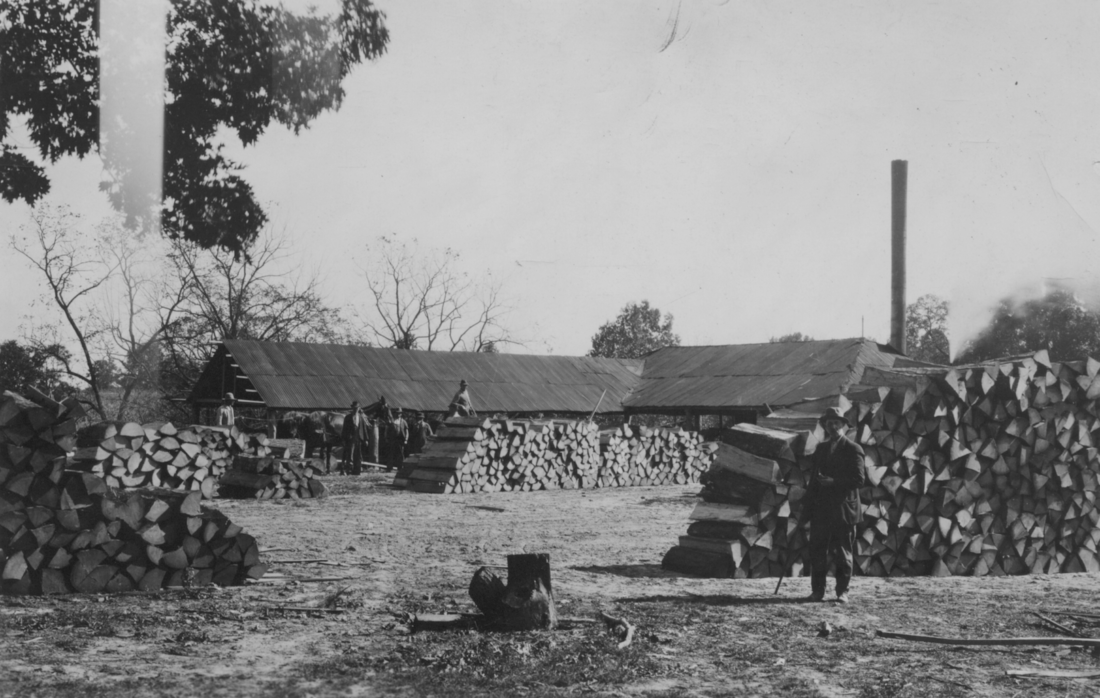In the winter of 1930, amid the onset of the Great Depression, city officials authorized the formation of the Unemployment Council. At the time, Asheville’s unemployment rate stood at 3% with roughly 1,500 of the city’s 50,000 residents jobless, according to a Dec. 2, 1930, report in The Asheville Citizen.
On Dec. 14, 1930, the Sunday edition of the Asheville Citizen-Times announced the committee’s first official project — a community wood yard located at the YMCA’s athletic field in downtown Asheville, on the corner Broadway and Woodfin Street.
Heavy snow on Dec. 17, however, delayed the project. But the committee was quick to adapt, employing roughly 50 workers to clear sidewalks and roads.
Soon thereafter, on Dec. 20, The Asheville Citizen wrote that plans to open the wood yard were imminent and would provide immediate relief. According to a statement by the Unemployment Council, published in that day’s paper, “Every cord of wood one buys will feed an average family for one week.”
By Jan. 9, 1931, the paper reported 140 total employees at the site. Divided into two groups, each crew worked three days a week. Instead of a paycheck, all participants received groceries, clothing and wood. Food items included:
“12 pounds flour, two pounds fatback, 10 pounds meal, two cans tomatoes, five pounds pinto beans, five pounds grits, one can syrup, two pounds oatmeal, 15 pounds Irish potatoes, 10 pounds onions, two heads cabbage, one pound coffee, two pounds sugar, four pounds lard and two pounds of butter.”
On Feb. 8, 1931, the Sunday edition of the Asheville Citizen-Times proudly boasted that Thad Hold, a member of President Herbert Hoover’s Emergency Committee for Employment, called the city’s wood yard system “the best scheme in the South for the relief of unemployment.”
According to the same article, Asheville had secured 300 cords of wood from Bent Creek since Dec. 15, 1930. Each day, roughly 50 men felled trees at the site and hauled the load to the community wood yard, where cords sold for $5 (roughly $77.82 in today’s dollar). “About 17 cords out of 100 are given to needy families,” the paper wrote.
Throughout the winter, fundraisers and benefits were also hosted to help families in need. By spring, warmer weather ended production at the wood yard. The Unemployment Council shifted its focus to a community gardens program, seeking public and private work for the city’s unemployed.
In a public statement featured in The Asheville Citizen on April 18, 1931, Ottis Green, general chairman of the Unemployment Council (and soon-to-be mayor of Asheville) declared:
“I cannot stress too much the fact that unless people who are able to will create work which will take care of the surplus workers, these men and their families will suffer as they did in the winter. … Work for them can be found in gardens and houses.”
Mrs. W. Vance Brown, chairperson of the group’s central committee, added, “Let each individual consider his property a link in the chain.” If everyone participated, she continued, “Then there will be developed an unbroken chain of giving a job and getting something from it.”
By Oct. 8, 1931, The Asheville Citizen stated that an average of 41 residents had secured work through the initiative over the previous 29 weeks.
The community wood yard returned that winter. But demand was low, likely due to the ongoing economic crisis. Available reports show only 44 residents were hired that season. Exact figures for the total jobless rate in Asheville were not available.
The following year, as the Great Depression continued, the Normal Business Council formed in response to Asheville’s ongoing unemployment crisis. In a matter of weeks, the group infused $250,000 (roughly $4.7 million in today’s dollar) into the local economy through a pledge campaign. (To learn more, see “Asheville Archives: Citizens respond to the Great Depression, 1932,” Xpress, Aug. 16)
Editor’s note: Spelling and punctuation are preserved from the original documents.
CORRECTION: The article was updated to reflect accurate inflation rates.



Before you comment
The comments section is here to provide a platform for civil dialogue on the issues we face together as a local community. Xpress is committed to offering this platform for all voices, but when the tone of the discussion gets nasty or strays off topic, we believe many people choose not to participate. Xpress editors are determined to moderate comments to ensure a constructive interchange is maintained. All comments judged not to be in keeping with the spirit of civil discourse will be removed and repeat violators will be banned. See here for our terms of service. Thank you for being part of this effort to promote respectful discussion.